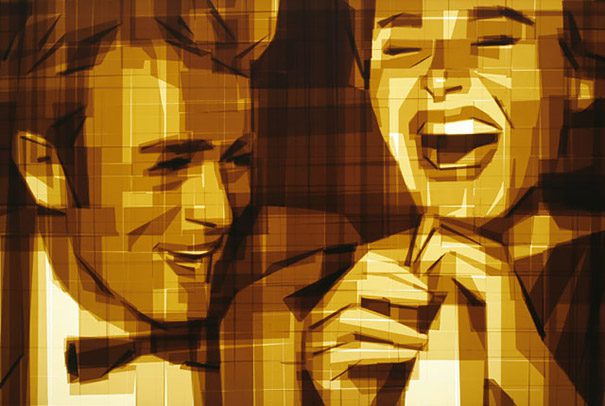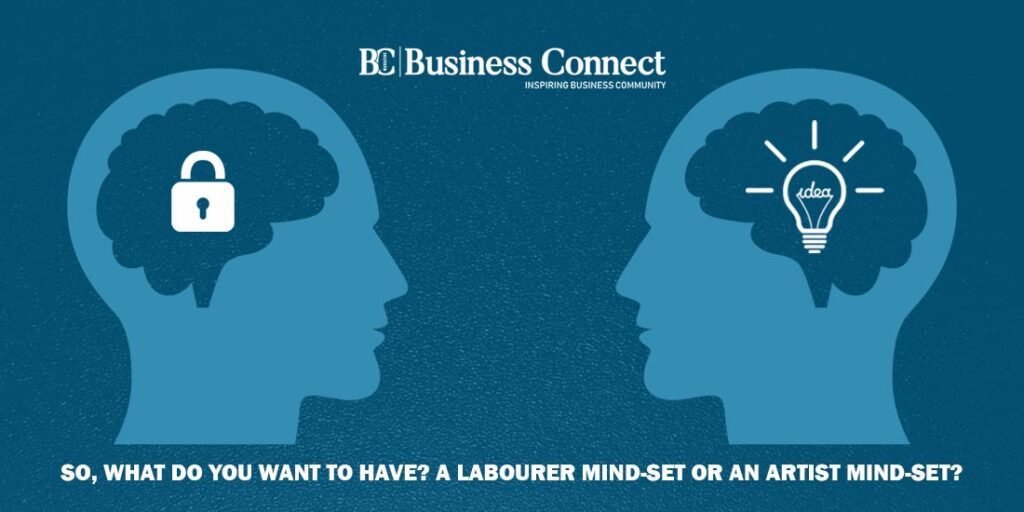So, what do you want to have? A labourer mind-set or an artist mind-set?
This is a grandmother’s tale. Because a grandmother is involved. My own. But don’t worry. It has some chewable points. For you, the new age professional. And you, the new age house of professionals (read: organisation).
Cooking is my daily ‘el dorado’, especially in quarantine time. I am trying to create dishes I have eaten in my childhood. One I have almost forgotten about in the whole business of growing up. So, I called up my grandmother who lives in the remotest and perhaps, forgotten part of the country for a recipe. She is great at some improbable food creations like cutlets with raw banana peel.
Grandmother is 83 years old and even now, very busy. So, she hurriedly and almost mechanically gave me the recipe I wanted. Everything was approximate. Now, I always try to nurture my ‘intuitive intelligence’ but I am also a product of analysis, logic, precision, and predictability. So, in my sweetest manner, I asked her to repeat each step, ingredient, and measurement several times. In the end, in exasperation, she asked me this – Do you want to be a labourer of food or an artist?
‘What do you mean?’ I asked. To this, she directed me to an interview of her favourite modern-day classical Indian musician and asked me to call her back after I’d listened to it. Halfway through the interview, I found the ‘labourer/ artist’ allusion. And then everything fell in place. Well, almost.
In response to a question in the interview, the singer was explaining how her father and guru (a very accomplished artist himself) had told her that as a musician, she had the choice of becoming a ‘labourer of music’ or an artist. In his description, a labourer of music is highly skilled and renders beautifully complex compositions with a lot of effort. The audience marvels at his/her competence. An artist, on the other hand, does the same effortlessly. And he/she leaves the audience moved.
OK, grandmother-1, me-0. I called her back. Like the wise old owl she is, she told me a few things that I am sharing with you below. These are the chewable points I promised:
Grandmother: ‘The recipe is the craft which I have given you. Your artistic execution of it will depend on a few other things too. Like, your inner expansion and your effortlessness.’
Inner Expansion
My inner expansion? Is my execution of the recipe going to be an extension of myself? By that logic, any output in any project or piece of work, is also a function of other endeavours, activities, pursuits, conversations, and relationships in one’s life? Wow. For example and hypothetically, apart from following the recipe well, my effortless execution of it may be a result of how much I cherish old and forgotten things, my understanding and appreciation of food as celebration, my perspective on the current quarantine situation and perhaps even how I spend my entire day.
If everything is connected so closely, why do we as professionals and organisations only invest in knowledge, techniques, skills, and abilities? What about investing in perspectives, attitudes, interests, inspiring conversations, meaningful exposure, and self-discovery? One can argue that every element of growth cannot be shouldered by one’s company. But what if an individual’s holistic growth directly translates into amazing company work fetching growing returns for his/her firm? Because, it does.
Plus, most of us spend approximately 8-10 significant hours, 5-6 days a week, at the workplace. One can also argue that a bigger pay packet for an employee with more ‘inner expansion’ is the company’s way of rewarding them and therefore, providing the required impetus to the individual to continue to ‘expand’ deeper. But, that is blatant evasion from investing in human capital. Without this investment, a company’s human capital will likely be lowercase.
This does not absolve us as professionals from our own inner expansion responsibilities. After all, if we choose to be artists in our field of work – photography, coding, graphic design, or accounting – it is not going to be possible by just accumulating degrees, diplomas, or expertise. It will involve more – the company we keep, the conversations we have, the books we read, the shows we attend, the way we spend empty time, and most importantly, our knowledge of ourselves.
Effortlessness
Effortlessness? Meaning natural, engaging, intrinsically-rewarding? The sense of total-absorption and ease even in the face of extremely hard work? But, how?
I am reminded of all the times I teach a yoga class. I feel ‘in the zone’; it is so enjoyable it feels almost effortless. I think it starts with doing what you like. At this point, I am prepared to be the recipient of ‘rolling eyes’ from some of you who are thinking that having a job you love is a privilege and not a choice. Of course, I certainly believe it is a choice that most of us have and I say this from first-hand experience. It may be a hard choice with hard compromises but the returns are worth it.
Mihaly Csikszentmihalyi, in his seminal work, Flow: The Psychology of Optimal Experience, outlines his theory that people are happiest when they are in a state of flow—a state of concentration or complete absorption with the activity at hand and the situation. It is a state in which people are so involved in an activity that nothing else seems to matter. He identifies fairly universal experiences while in a flow state. Now, we only need to figure out a way to either bring as many elements of effortless flow (as listed by Csikszentmihalyi) to our jobs or start looking at other ways to earn our living that will give us the greatest opportunity to spend the most time in an effortless flow. That is, assuming, we would like to cultivate an artist mind-set.
Grandmother: ‘Even if I had an exact recipe, I can’t always control the quantity and quality of required ingredients and the amount of time I have to execute the dish. So, I hope you can create a good dish even if all the raw material isn’t available all the time’.
Talking about limitlessness in complexity and constraints, are we?
Limitlessness in complexity
Bravo, grandma! No better time to raise this point than now, in Covid-19 and quarantine time. Talking of complexity, the problems the world is facing today cannot be solved in conventional ways. By looking at the world with an artist’s mindset, we can break through thought patterns, find new approaches and perspectives, even when the situation seems hopeless.
Why then are we and most of our universities and companies still largely invested in learning about trends, patterns, formulas, processes, rules and algorithms, while slipping in the odd ‘complexity and change’ course as an optional learning program, if at all? What about proactively building a culture for all career levels that allow us to embrace uncertainty and ambiguity and let our imaginations run without our inner critic shutting us down? I agree that an immediate ROI may not be visible for such courses/ interventions/ programs but the benefits of building such a mind-set in all kinds of organisations are long-term and unmatched. Good things take hustle. Great things take time.
Limitlessness in constraints
Talking of constraints, have you ever encountered a situation where you give a team the full time that they ask for, or the full budget that they want, or the full number of people that they need, and those teams never execute anything of significance? And have you also encountered a situation where constraints and challenges motivate people to generate novel ideas for new products, services, or business processes?
Much has already been written and said about ‘doing more with less’. As former Unilever CEO Paul Pulman said, Frugal Innovation can help create an “age of opportunity” even in the “age of austerity”. It is a mindset rather than a model. An artist creates from nothing. To create something from nothing, we also need a certain ‘limitlessness’ mind-set.
Ukraine-born artist Mark Khaisman creates truly outstanding art using a really mundane material – brown packaging tape. By putting various layers of translucent tape onto Plexiglass and then cutting it into certain shapes, the artist remakes scenes from old Hollywood movies, art history, certain 20th-century cultural icons, or his own photographs. The final image makes you appreciate brown tape a lot more, as it creates a stunning sepia effect that makes the images seem nostalgic.

How comfortable with complexity and constraints we can all be if we continue to develop this ‘limitlessness with limits’ attitude even in times of stability and abundance. Of course, India is a trailblazer and thought-leader in this space and has much to offer in creating a frame of mind that sees unpredictability and resource constraints not as liabilities but as opportunities.
Being an artist is a mindset that can be applied to whatever work we do. Most of us just don’t even realize it. Think about all the things at the office that we inject our personality and style into emails, projects, interactions with colleagues and clients, presentations, etc. Being an artist at work starts with awareness and continues with intention.
Everyone has a grandma’s tale to tell. And today, this is mine. I am sorry I cannot share grandma’s recipe here; it’s a family secret.
So, what do you want to have? A labourer mindset or an artist mind-set?
Writer biography –
Debapriya Nag
Debapriya is the co-founder of Mi-Shift, a boutique learning organisation that is focused on individual and organisational transformation. She has worked closely with leaders and university students to offer them new perspectives towards business, society, and self.
With many years of experience in talent planning and acquisition, talent engagement, HR transformation, and her love of change and people, she designs a strategy and operationalises learning programs that enable seasoned and new leaders undergo a mindset shift helping them generate new possibilities for themselves, their companies and their societies.



